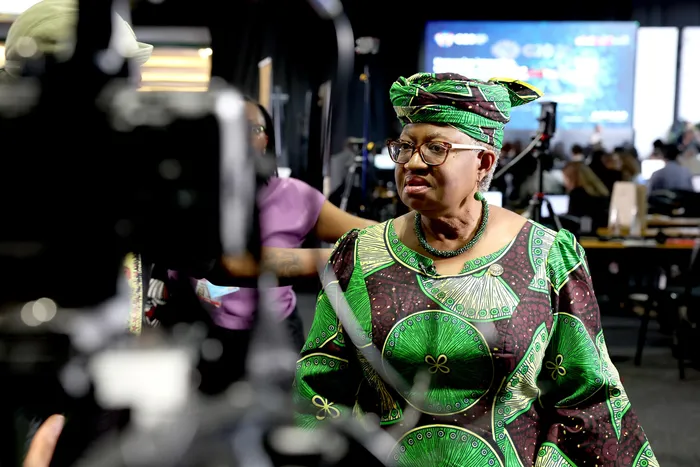
Speaking on the sidelines of the G20 Leaders' Summit in Johannesburg on Sunday, Okonjo-Iweala acknowledged that the United States’ aggressive tariff actions, including high unilateral duties and a growing number of bilateral trade deals outside the WTO, have disrupted global commerce.
Image: Supplied/GCIS
Despite deep ruptures in the global trading system caused by sweeping US tariffs and escalating geopolitical tensions, Africa’s trade has remained far more resilient than many feared.
That was the message from World Trade Organization (WTO) director-general Ngozi Okonjo-Iweala, who said the continent has been insulated from the worst impacts of the tariff battles reshaping economic relations among major powers.
Speaking on the sidelines of the G20 Leaders' Summit in Johannesburg on Sunday, Okonjo-Iweala acknowledged that the United States’ aggressive tariff actions, including high unilateral duties and a growing number of bilateral trade deals outside the WTO, have disrupted global commerce.
But despite the turmoil, she said the global system has held together more than expected — and Africa, in particular, has not suffered the kind of trade contraction that many predicted.
"It is indeed true that world trade has been disrupted in a way that it hasn't been in the past 80 years, in eight decades. And we should acknowledge that," Okonjo-Iweala said.
"But it is true that when we do the analysis, we find that 72% of world trade is still taking place on World Trade Organization rules. So, this means that almost three quarters of world trade is still going on on WTO rules. Yes, it's down from 80% free tariffs to now."
She noted that while tariffs between the US, China and Europe have intensified, but added that most countries, including those in Africa, have deliberately chosen not to retaliate, keeping trade lanes open and maintaining stability.
"We should remember that the US is 30% tariffs. So, what is happening is, this is possible because the rest of the world is not really taking part in that exchange of things," she said.
"They are not trying to retaliate in any way, which is good. It's good for global trade and global health. They are also continuing to trade with each other on the WTO tariffs. So, this is why we have this."
Okonjo-Iweala said Africa’s limited exposure to US manufacturing supply chains, combined with its strong reliance on intra-African and South–South trade, has helped cushion the blow.
She said the key factors include the fact that Africa trades more with itself and emerging markets than with the US in tariff-sensitive sectors. She said the high cost of intra-African trade — 20% more expensive than trading with outside markets — means disruptions elsewhere have less relative impact.
She added that many African exports to the US fall under preferential schemes like African Growth and Opportunity Act, which remain largely untouched by the tariff escalations.
“Trade costs within Africa are extremely high,” Okonjo-Iweala said. “Even among ourselves, it costs 20% more to trade with each other than with the outside world. In a strange way, this structural challenge has shielded us from external trade wars.”
Okonjo-Iweala cautioned that US tariff policy cannot be viewed in isolation. This complexity, she said, is one reason why African governments should not rush to pick sides in global tariff disputes.
"Because when these negotiations are going on, it's not only about trade. There are also security issues involved. There are issues about immigration. There are issues about critical minerals. They're all factored into these bilateral negotiations in a way that the WTO cannot get in," she said.
"It's very complex. And that is why, on a bilateral level, I will be careful in passing judgment because governments are dealing with a very difficult, complex situation."
With Africa holding 30% of the world’s critical minerals, Okonjo-Iweala stressed that the continent must not repeat past patterns of exporting raw materials without benefiting from value addition.
"African leaders are saying clearly that this has to change, that there has to be more value added on the continent. South Africa has put a G20 framework on critical minerals, which I think is a great initiative. And the whole idea is that let us add value to these critical minerals," she said.
"We can go from raw materials all the way to finished product by creating sub-regional and regional value chains. It's not just about adding value and therefore trading off and getting a greater share of gold trade. I think the issue is to get the investment in. To do that, we must reduce barriers to investment and we must reduce costs to trade."
Okonjo-Iweala warned that despite its resilience so far, Africa would be the biggest loser if the global trading system disintegrates.
"So if that ladder of using the world trading system is kicked away, guess what? Who is going to lose? We wouldn't have had our turn to try and benefit. So certainly we should fight to make sure that the system is kept in place, the rules are improved, but not the way it is," she said.
She reiterated her call for WTO reforms to make the system more flexible, transparent and responsive to the needs of developing economies.
BUSINESS REPORT